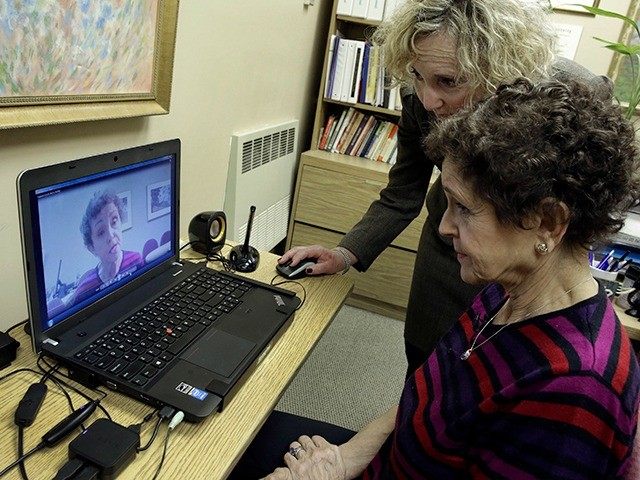In the 2004 romantic comedy 50 First Dates, Adam Sandler’s character courts a young woman (Drew Barrymore) with dementia as a result of brain damage, and late in the film, helps her to remember him each day with a video of who he is and how they met.
At the end of the film, through the daily video, Barrymore’s character is brought up-to-speed about her condition, as well as all the events that have unfolded in her life since the loss of her memory, which is designed to help her both cope, and adjust smoothly upon waking up.
While based off fiction, similar prerecorded messages from family members are now part of a pilot program at the Hebrew Home at Riverdale in New York, aimed at helping victims of Alzheimer’s and other types of dementia adjust to the terrifying morning fog of the diseases, according to a recent report.
Watch Sandler’s video in 50 First Dates:
Without the use of drugs, the nursing home’s director of social services, Charlotte Dell, told the AP, “we’re looking to see if we can set a positive tone for the day… what better way to start the day than to see the face and hear the voice of someone you love wishing you a wonderful morning?”
Just like in 50 First Dates, the video has become part of the morning routine for some patients, after Dell thought, “how could that translate to our residents with memory loss?”
According to the report, relatives who partake in the video exercise are asked to say good morning to their loved ones and use memory-triggering personal anecdotes to remind them attendants will be helping them get ready for their day.
Waking up with dementia is frightening for some patients, because they do not know where they are or who is taking care of them. One patient said of her place in her mother’s daily video, “I am there with my mom, loving her and wishing her a wonderful day and helping her to feel better because there’s not a lot I can do for her.”
While the woman has reportedly expressed a fear of being lost, her son-in-law tells her every morning on the video, “I know where you are. … I will always find you.”
Alzheimer’s disease and other debilitating forms of dementia are affecting a growing number of Americans, as people begin to lead longer lives. More than five million Americans are now living with the disease, baby boomers in particular, per the Alzheimer’s Association.
Geriatric psychiatrist Robert Abrams, who works for the New York-Presbyterian Hospital, reportedly described the daily video program as “both innovative and thoughtful.”
“You’ve got a group of people with dementia who don’t really grasp the nature and purpose of their surroundings or the circumstances that compelled them to be there,” Abrams told the AP. “Consequently, they’re alone and at sea and feel frightened and even abandoned by family.”
Experts cautioned in the report that Alzheimer’s patients vary widely in severity, and techniques that may work well for one patient may not work at all for another.
The program at the Hebrew Home is also limited only to patients residing in the facility’s areas for early and moderate stages of dementia, those who are more likely to recognize the people in the video and understand them.
Despite its limited use, the program has done well, and the Hebrew Home plans to expand it to more of its hundreds of memory-care residents, after results Dell described as “very positive.”

COMMENTS
Please let us know if you're having issues with commenting.